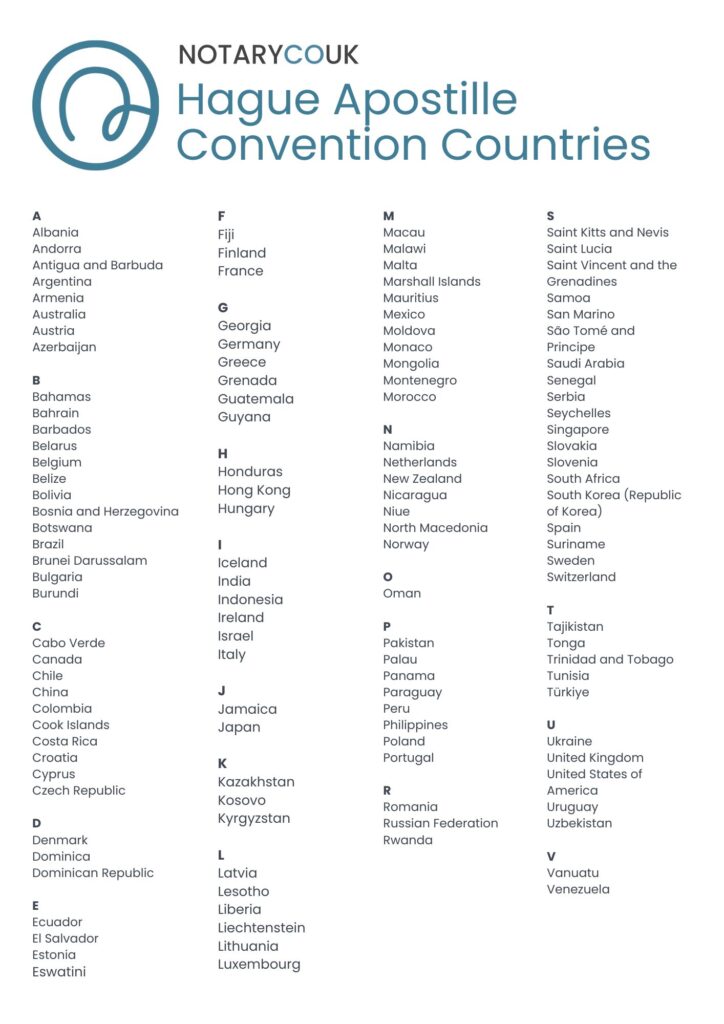As countries across the globe become more and more connected, there’s an increasing need for compatible legal processes. The Hague Conference on Private International Law (HCCH) is an intergovernmental organisation working towards this goal.
The organisation arranges international treaties called Hague Conventions. Here, representatives from member nations form legal, administrative and judicial agreements.
In this guide, we aim to demystify the Hague Convention. We’ll break down its significance, list the countries involved, and explore some key historical conventions, with a focus on the Hague Apostille Convention of 1961.
What is the Hague Convention?
The Hague Convention is an international treaty intended to unify legal processes across member countries. The HCCH organises individual conventions to form agreements on specific issues.
Significant previous Hague Conventions include the following:
- 1961 Apostille Convention
- 1970 Divorce Convention
- 1980 Child Abduction Convention
- 1980 Access to Justice Convention
- 1993 Adoption Convention
- 1996 Child Protection Convention
- 2005 Choice of Court Convention
- 2019 Judgments Convention
The Hague Apostille Convention of 1961
As notaries, the most relevant to us is the Hague Apostille Convention (Abolishing the Requirement of Legalisation for Foreign Public Documents).
Introduced in 1961, the convention aimed to simplify the process of legalising documents to be used internationally.
Since then, more than 125 contracting parties have agreed to recognise an ‘apostille’, which is a standardised certificate acknowledging the authenticity of a document. Previously, each country would expect foreign visitors, businesses or governments to complete its own unique document legalisation process.
An apostille must be attached to the relevant document by a ‘competent authority’. In the UK, you can instruct a notary public like Notary.co.uk to secure an apostille from the FCDO (Foreign, Commonwealth and Development Office).
This apostille communicates to authorities in fellow Hague Apostille Convention member countries that it is a genuine and authenticated document. Most documents should not need further certification.
Having a consistent method of document certification makes it much easier to collaborate with organisations overseas, whether on a personal, business or governmental level.
The Convention covers many kinds of documents, including the following examples:

List of Hague Apostille Convention Countries (Members and Contracting Parties)
The Hague Conference on Private International Law (HCCH) has an impressive list of member countries, and there’s an even greater number of countries that recognise the apostille. This list is incredibly diverse, with both major economic powers and smaller, more developing countries.
To ensure hassle-free international exchanges, check if your country and/or the country receiving your documentation is a member of the Hague Convention’s apostille agreement. The countries and states that recognise the apostille as of 2023 are listed below.

How to Know if You Need an Apostille For Your Document
You should first check with whoever is requesting the document from you. The requesting authority will often state whether they require notarisation only, an apostille, or further embassy legalisation.
If you’re engaging in international activities, whether business-related or personal, you may need to have certain documents apostilled. These will typically be documents such as contracts, powers of attorney, or academic transcripts.
If in doubt, we recommend consulting a notary service. A qualified notary will identify the documents that require apostille certification and make sure you are compliant with international legal standards.
Submitting Documents to Countries Outside of the Hague Convention Apostille Agreement
If the country you are visiting or sending documents to is not listed above, you will need to have your document legalised by the consulate of that country. In the UK, this means you will need to have the document notarised and/or apostilled first before being submitted to the consulate.
A certificate of notarisation will involve the notary certifying the document whilst the apostille is the act of the UK government confirming the notarisation is authentic. The consulate will then check that both the notary and the UK government have attested it, and will affix their own stamp.
Every consulate has different requirements and charges different fees to legalise documents. Our experienced team deals with all the consulates who offer legalisation in the UK, and can both guide you through and handle the entire consular legalisation process for you.
The Hague Convention and the UK
The UK was the seventh country to sign up to the Hague Apostille Convention in 1961 and became the joint first country with France to bring it into force in January 1965.
Since then, UK authorities have been obliged to accept apostilles issued in other contracting member states without the foreign documents requiring further legalisation. In return, documents originating in the UK and bearing an apostille will be accepted in any foreign country where the Hague Apostille Convention has entered into force.
The only competent authority to issue apostilles within the UK is the Legalisation Office, which is part of the Foreign, Commonwealth and Development Office (FCDO). On 29 December 2023, the FCDO permanently closed the Premium Service Legalisation Office in London. From 1 January 2024, it only issues apostilles from their Legalisation Office in Milton Keynes.
Our team submit and collect documents from the Legalisation Office in Milton Keynes every day and can help with any apostille request you have.
Conclusion
To summarise, the Hague Convention organises multilateral treaties that promote international cooperation and streamline legal processes across the world. Through the Apostille Convention, the HCCH has made legal transactions across borders much simpler.
It is still important to check the specific requirements of the party receiving your documentation. For peace of mind, we recommend checking an up-to-date list of the Hague Apostille Convention’s contracting parties and consulting a notary public.
Our notaries have a comprehensive knowledge of legal requirements in Hague Convention countries and beyond. If you’re sending documents abroad and you think you may need an apostille, contact us today.

